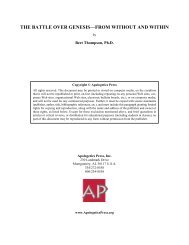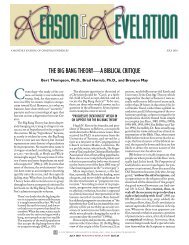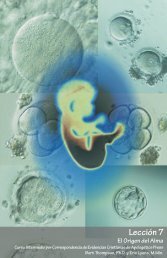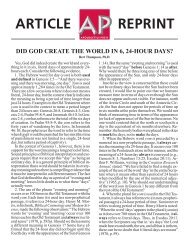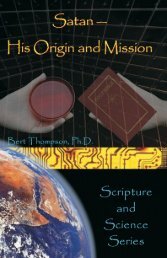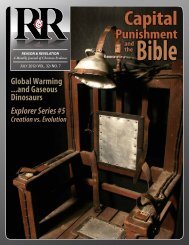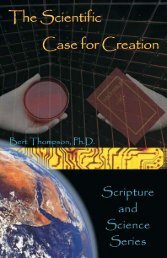The Many Faces, and Causes, of Unbelief - Apologetics Press
The Many Faces, and Causes, of Unbelief - Apologetics Press
The Many Faces, and Causes, of Unbelief - Apologetics Press
You also want an ePaper? Increase the reach of your titles
YUMPU automatically turns print PDFs into web optimized ePapers that Google loves.
Certainly, it cannot mean that Jesus was incapable <strong>of</strong> performing<br />
miracles on this particular occasion. As a member <strong>of</strong><br />
the Godhead, He was all-powerful (cf. Genesis 17:1, 1 Timothy<br />
6:16), <strong>and</strong> could not be restrained (cf. Job 42:2). Thus, He<br />
could do anything not contradictory to His nature (Habakkuk<br />
1:13; Hebrews 6:18; James 1:13). Performing a miracle certainly<br />
was not contradictory to that nature. In fact, on numerous<br />
other occasions He had cured those who were blind (Matthew<br />
9:27ff.), deaf <strong>and</strong> dumb (Mark 7:31ff.), leprous (Luke 17:<br />
11ff.), or had crippled limbs (Matthew 9:2; 12:10). He even<br />
raised the dead (Luke 7:11ff.). Why, then, does the text specifically<br />
record that “he could do there no mighty work”?<br />
When Matthew discussed this event in his Gospel, he wrote:<br />
“And he did not many mighty works there because <strong>of</strong> their<br />
unbelief” (13:58, emp. added). Why, then, did Mark say that<br />
the Lord could not do mighty works? <strong>The</strong> Greek employed<br />
in Mark’s expression is ouk edunato. Wayne Jackson has pointed<br />
out:<br />
<strong>The</strong>se words are idiomatically used in the New Testament<br />
occasionally to denote what one deliberately<br />
purposed not to do. Perhaps some examples will<br />
be helpful. In one <strong>of</strong> the Lord’s parables, he has a<br />
man, who is rejecting the invitation to a great supper,<br />
say, “I have married a wife, <strong>and</strong> therefore I cannot<br />
[ou dunami] come” (Luke 14:20). It was not that the<br />
man was literally unable to attend; rather, for other<br />
reasons he chose not to do so. Again, John writes:<br />
“Whosoever is begotten <strong>of</strong> God doeth no sin, because<br />
his [God’s] seed abideth in him: <strong>and</strong> he cannot [ou<br />
dunatai ] sin, because he is begotten <strong>of</strong> God” (I Jn. 3:<br />
9). This passage teaches that the child <strong>of</strong> God, because<br />
<strong>of</strong> the seed [the Word <strong>of</strong> God—Luke 8:11] that abides<br />
in him, chooses to refrain from practicing a life <strong>of</strong> habitual<br />
sin. So, similarly, the Lord determined not to<br />
perform many mighty works in his own country because<br />
<strong>of</strong> the quality <strong>of</strong> unbelief that was characteristic<br />
<strong>of</strong> them.<br />
- 120



